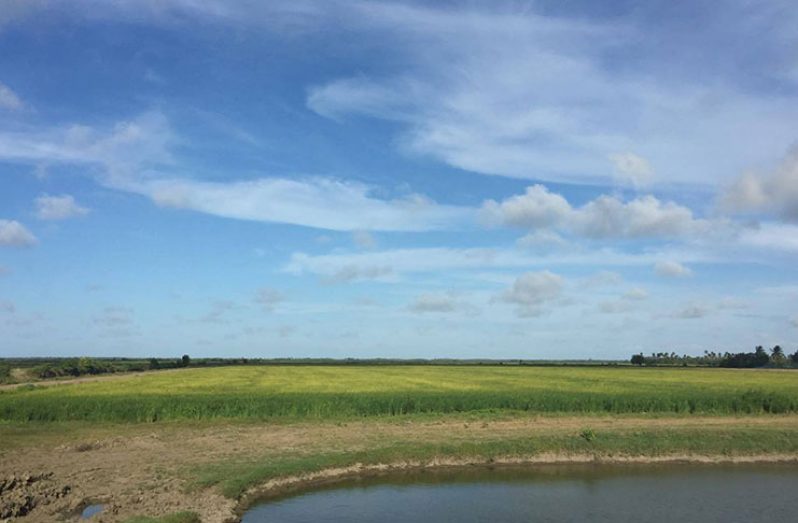Rameshwar Singh, 23, sits in the cool breeze brought in from the Atlantic Coast. In his yard at Black Bush Polder, in the Berbice region, are giant machines called ‘Combines’ used for cutting rice. But these days he is left to wonder if the ‘Combines,’ together with the tractors and motorbikes used in the family business, will eventually rot into the earth that has been there bread and butter for decades.
His grandfather, now 87, started cutting rice as a lad, and urged him to “carry on” the family business, and in fact, that’s how Rameshwar was groomed since he was five-years-old.
The erratic price on the world market, together with the loss of the major Venezuelan rice market, has been the source of a major headache for the rice industry. Latest data shows that as of last month, rice was trading at US$368 per metric tonne compared to US$547.48 in February of 2012. The price hit a low of US$354.35 in December 2015, but bounced back to as high as US$456.24 in July of 2016 and somewhat levelled off within the US$360-US2$370 range since.

To compound matters, farmers say the cost of production is high. And what is more, they have to contend with poor drainage and irrigation. The latter problem means farmers have to use mechanical pumps to drain and irrigate lands. To make ends meet, many farmers have now opted to do three crops instead of the traditional two that coincides with the rainy seasons.
Usually, farmers prepare their lands and await the start of the rainy seasons to irrigate their lands. This natural form of irrigation not only cuts out the burdensome cost of fuel, but “the blessing from above“ makes the crop bloom better than the trench water they have to pump in.
However, with the reduction in the price per bag of paddy, many farmers are now pushing for three crops a year and planting a 100 day genetically modified seed paddy to increase their yields and start the preparation for the next crop.
The result is catastrophic since some farmers are hoarding water to flood their fields while others are releasing water in preparation for harvest. This not only affect the yield of lands as they are hurriedly prepared, but increases the cost of production since the land are less fertile and would require more fertilizers as well as fuel cost for irrigation and drainage of water from the fields.
With the litany of problems facing the sector, Berbice rice farmers, like Rameshwar, are hoping that the oil find by ExxonMobil, 200 miles offshore, will give them something to look forward to.
“Things tough and I hope that with oil we can get fuel cheaper so we can save. Rice is in my blood; I will not give it up,” he says.
Rice farmers are not the only ones looking to developments in the oil and gas sector. Rice has served as the twin to sugar when it comes to the agricultural sector in Guyana. In fact, Berbice is prized as the sugar belt in Guyana and the former PPP government moved to set up a world-class plant at Skeldon. Built at a cost of US$180 million and opened in 2009, the Skeldon Modernization Plant was hailed as the boon to the survival of the sugar industry – in the face of falling prices and the loss of the lucrative European market.
But sugar workers have bemoaned Skeldon’s “dead duck” status. The factory has failed to live up to expectations. It should have been producing 450, 000 tonnes annually, but is now producing below 50% of that capacity. Things took a turn for the worse early last month when the Skeldon Energy Inc. (SEI) informed the Guyana Sugar Corporation Inc. (GuySuCo) that the co-generation plant was unsafe to operate and advised that the First Crop 2017 should no longer take place as up to seven months were required to address the problem.
Over the years, the co-generation plant has suffered serious deterioration. This was confirmed by a recent audit. The plant became progressively unreliable adversely affecting the operations of the sugar factory and resulting in reduced sugar production and less power for the national grid, GuySuCo stated.
Apart from Skeldon, the three other sugar estates- which provide employment for hundreds- has been the flame of the Berbice economy for years. With troubles in rice and sugar, Berbicians are seeing tough times.
“There is no money. People don’t have spending power. Whatever little they have them spending on food only; business bad.” That’s the comment you get from most businesses in the Upper and Central Corentyne areas.
The hire car and mini bus drivers have similar cries. “People are not travelling. We are not even getting school children, because the Granger (School buses) cleaning up the road,” said one driver.
With many investing heavily in rice, sugar and the businesses that have thrived off of them for years, Berbicians are hoping to keep their doors open for the time when the oil begins to flow. ExxonMobil estimates that the oil wells it has discovered has as much as 1.4 billion barrels of oil, and has begun a US$5 billion investment to begin oil extraction in 2020.
“I can’t wait for oil to start drilling because I know a lot of people from Suriname will come over to start business here; that means more passengers on the road for me,” one taxi driver said.
“I know there will be plenty of money and people will build more and I will get work. But I will continue cutting cane for now,” said Joel Harper a mason/carpenter who is also a cane harvester.
David Chan of Warren Village, #19 Highway, has been a hire car driver for over fifteen years and he has heard conversations about the prospects for oil. He said his focus currently is educating his three children, ages 13 to 18, to pursue careers in the oil and gas sectors since he believes there would be immense job opportunities that will be available for them.
“I want to make sure that they get that chance because oil will pay good and they would be able to take care of me and their mother when we get old,” said Chan.
With the announcement that consideration is being given to the setting up of a world class refinery at Crab Island in the Berbice River, many are looking at the potential business opportunities.
Regional Chairman, David Armogan, who oversees the East Corentyne/Berbice region, has disclosed in an interview with this publication that there has been a recent spike in applications for development of significant portions of land at Crab Island. The chairman confirmed that the Lands and Survey department is currently processing the applications. He noted that many are for inland capacity to aid in the offshore drilling operations.
But while most are eagerly awaiting the commencement of the operations to get a piece of the pie, there are worried about the negative effects, and some have even theorized this to the bizarre.

“I don’t like this oil thing. When they start, all kinds of bad things will happen. When they start disturbing the sea bed we might soon get earthquakes and so,” said Satesh.
Others fear mismanagement of the funds that will come from oil. “If you look at Venezuela – they are producing oil but yet their people are starving.”
But the current government is seeking to assure Berbicians, and the entire country, that the oil revenues would be well managed.
“To avoid the pitfall of other countries who were surprised with the oil wealth and didn’t know what to do with it, we are being prepared to receive this wealth,” Basil Williams, the country’s Attorney General said last week at a meeting held with Berbicians at the village of Limlair.
“All our international partners are assisting; the ABC countries, our neighbours and all around the world. We are getting assistance and we don’t want when we receive this wealth, we don’t want the Dutch Disease that has inflicted Trinidad and most other oil countries; that all our resources move into the oil industry and abandon agriculture and abandon other sectors and when the prices fall we are caught without our own food,” Williams.
Will oil really prove to be the black gold for Berbice, and for Guyana?



.jpg)










